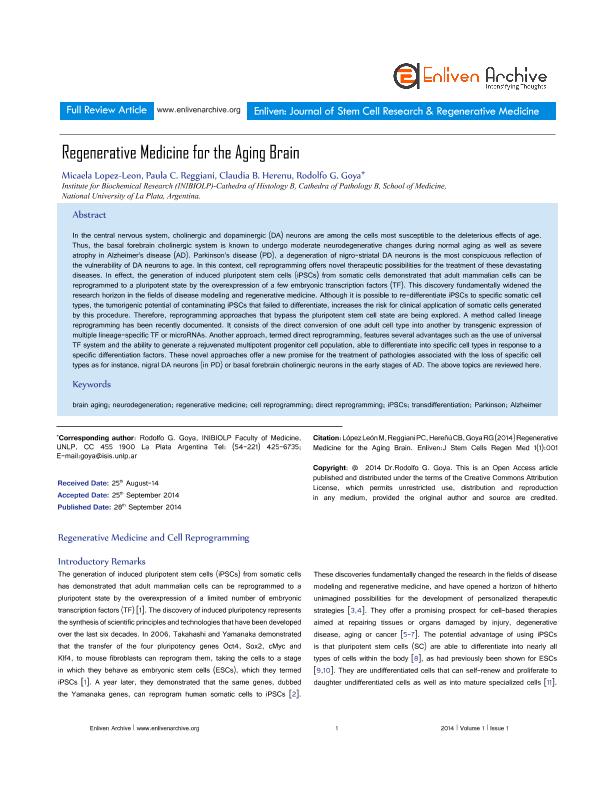Artículo
Regenerative Medicine for the Aging Brain
Fecha de publicación:
12/2014
Editorial:
Enliven
Revista:
Journal of Stem Cell Research and Regenerative Medicine
ISSN:
2379-5751
Idioma:
Inglés
Tipo de recurso:
Artículo publicado
Clasificación temática:
Resumen
In the central nervous system, cholinergic and dopaminergic (DA) neurons are among the cells most susceptible to the deleterious effects of age. Thus, the basal forebrain cholinergic system is known to undergo moderate neurodegenerative changes during normal aging as well as severe atrophy in Alzheimer’s disease (AD). Parkinson’s disease (PD), a degeneration of nigro-striatal DA neurons is the most conspicuous reflection of the vulnerability of DA neurons to age. In this context, cell reprogramming offers novel therapeutic possibilities for the treatment of these devastating diseases. In effect, the generation of induced pluripotent stem cells (iPSCs) from somatic cells demonstrated that adult mammalian cells can be reprogrammed to a pluripotent state by the overexpression of a few embryonic transcription factors (TF). This discovery fundamentally widened the research horizon in the fields of disease modeling and regenerative medicine. Although it is possible to re-differentiate iPSCs to specific somatic cell types, the tumorigenic potential of contaminating iPSCs that failed to differentiate, increases the risk for clinical application of somatic cells generated by this procedure. Therefore, reprogramming approaches that bypass the pluripotent stem cell state are being explored. A method called lineage reprogramming has been recently documented. It consists of the direct conversion of one adult cell type into another by transgenic expression of multiple lineage-specific TF or microRNAs. Another approach, termed direct reprogramming, features several advantages such as the use of universal TF system and the ability to generate a rejuvenated multipotent progenitor cell population, able to differentiate into specific cell types in response to a specific differentiation factors. These novel approaches offer a new promise for the treatment of pathologies associated with the loss of specific cell types as for instance, nigral DA neurons (in PD) or basal forebrain cholinergic neurons in the early stages of AD. The above topics are reviewed here.
Palabras clave:
Stem Cells
,
Reprogramming
,
Regenerative Medicine
,
Aging Brain
Archivos asociados
Licencia
Identificadores
Colecciones
Articulos(INIBIOLP)
Articulos de INST.DE INVEST.BIOQUIMICAS DE LA PLATA
Articulos de INST.DE INVEST.BIOQUIMICAS DE LA PLATA
Citación
López León, Micaela; Reggiani, Paula Cecilia; Hereñú, Claudia Beatriz; Goya, Rodolfo Gustavo; Regenerative Medicine for the Aging Brain; Enliven; Journal of Stem Cell Research and Regenerative Medicine; 1; 1; 12-2014; 1-9
Compartir




